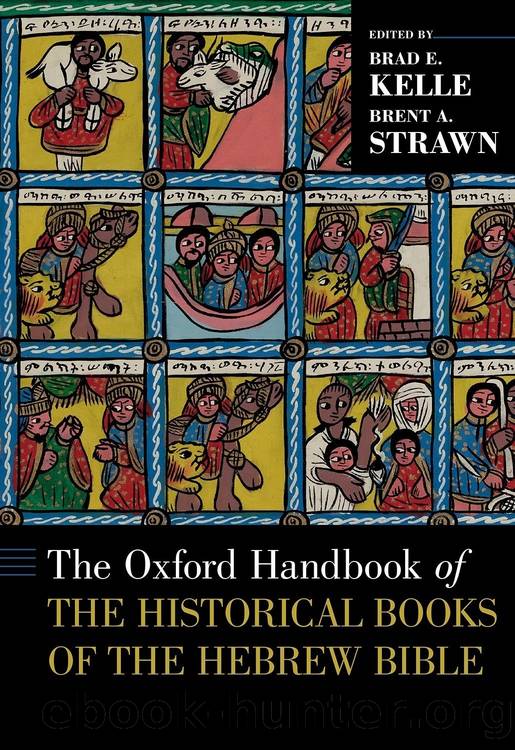The Oxford Handbook of the Historical Books of the Hebrew Bible by Brad E. Kelle;Brent A. Strawn; & Brent A. Strawn

Author:Brad E. Kelle;Brent A. Strawn; & Brent A. Strawn [Kelle, Brad E. & Strawn, Brent A.]
Language: eng
Format: epub
ISBN: 9780190074111
Publisher: OUP Premium
Published: 2020-10-03T00:00:00+00:00
Chapter 19
Divine and Human Violence in the Historical Books
Douglas S. Earl
Prior to the 1990s the Old Testament historical books were seldom characterized in terms of violence.1 For instance, in the Summa Theologiae, Thomas Aquinas did not consider the issue of violence in relation to biblical narratives. Likewise, with regard to Joshua, a narrative frequently characterized in terms of violence today, ancient interpreters did not use the concept of violence in its interpretation, even though they were aware of moral difficulties. For example, Augustine considered whether Joshuaâs campaign summary (Josh. 11:14) reflects horrible cruelty, and concluded not. God ordered the campaign so we judge wrongly if we consider it a great evil (see Questions on Joshua 16 in Franke 2005: 67), a view reflected by Calvin (e.g., on Josh. 10:18; see 1949: 157â58), and recently Wright (2008).2
Origen took a different approach. He was alert to Joshuaâs moral difficulties, although unlike contemporary readers he seldom characterized them in terms of violence. However, in Homily 12 on Josh. 10:20â26 he makes a passing reference to violence, although the discussion is framed in terms of cruelty (see Homily on Joshua 12:3 in Bruce 2002: 123â24).3 Origenâs approach to the moral difficulty differs from the Gnostics here, who used it to repudiate the narrative, and the later Augustinian tradition, where perceived moral difficulties indicate human finitude. For Origen the moral difficulty at the literal level is real but a cue to locate the textâs significance otherwiseâspiritually, through intertextual canonical reading. Whilst Origen would no doubt agree with the Augustinian tradition regarding human finitude and God being the measure of all things, he takes Christ as portrayed in the New Testament as the foundation for our knowledge of God and as measure of all, including moral judgments. Origen takes as problematic what Augustine would not, through appeal to the revelation of God as most perspicuous in Christ rather than in the literal sense of Old Testament narrative. Yet Origen rejects the Marcionite hermeneutic, and will not repudiate the witness of scripture, understanding scripture to witness to God, but not literally as in Marcionite and Augustinian traditions.
Origenâs moral concerns and spiritual reading had faded from view by the modern era, during which concerns with moral difficulties, and violence in particular, were seldom articulated. An exception is Thomas Morgan, who explicitly contrasts âviolenceâ associated with the Mosaic and conquest traditions with the Abrahamic and Pauline traditions (1739: 105â14). However, such characterization had little lasting impact. To take paradigmatic examples from nineteenth-century German and English scholarship, neither Wellhausen (1885 [1882]) nor Driver (1891) discuss the historical books in terms of violence; in the mid-twentieth century, von Rad (1975 [1957]) does not either. Works in the late modern era are concerned mostly with historical-critical issues rather than ethical issues (e.g., Soggin 1972 [1970]; Boling and Wright 1982). âViolenceâ is not in view, even in revisionary works where one might expect it to be (Bainton 1960; Gottwald 1979).
There was a watershed in the 1990s with the appearance of various works characterizing
Download
This site does not store any files on its server. We only index and link to content provided by other sites. Please contact the content providers to delete copyright contents if any and email us, we'll remove relevant links or contents immediately.
A World Ablaze by Craig Harline(698)
Winning the War in Your Mind by Craig Groeschel(690)
White Too Long by Robert P. Jones(635)
In the Reign of King John by Dan Jones(633)
The Mission by David W. Brown(628)
History of the Church by Eusebius(601)
Beautiful Resistance: The Joy of Conviction in a Culture of Compromise by Jon Tyson(593)
No More Christian Nice Guy by Paul Coughlin(581)
A Spacious Life by Ashley Hales(562)
Three Messiahs : The Historical Judas the Galilean, the Revelatory Christ Jesus, and the Mythical Jesus of Nazareth (9781450259477) by Unterbrink Daniel T(556)
The Crusades: A History by Jonathan Riley-Smith(551)
The Black Church by Henry Louis Gates Jr(543)
The History of Palestine by John Kitto(511)
The Zionist Bible (BibleWorld) by Masalha Nur(509)
The Tale of the Tardy Oxcart (Swindoll Leadership Library) by Swindoll Charles R(500)
Why Study History? by John Fea(499)
Assassination of a Saint by Eisenbrandt Matt(485)
Descent Into Hell by Charles Williams(479)
The Cheese and the Worms: The Cosmos of a Sixteenth-Century Miller by Carlo Ginzburg(465)
